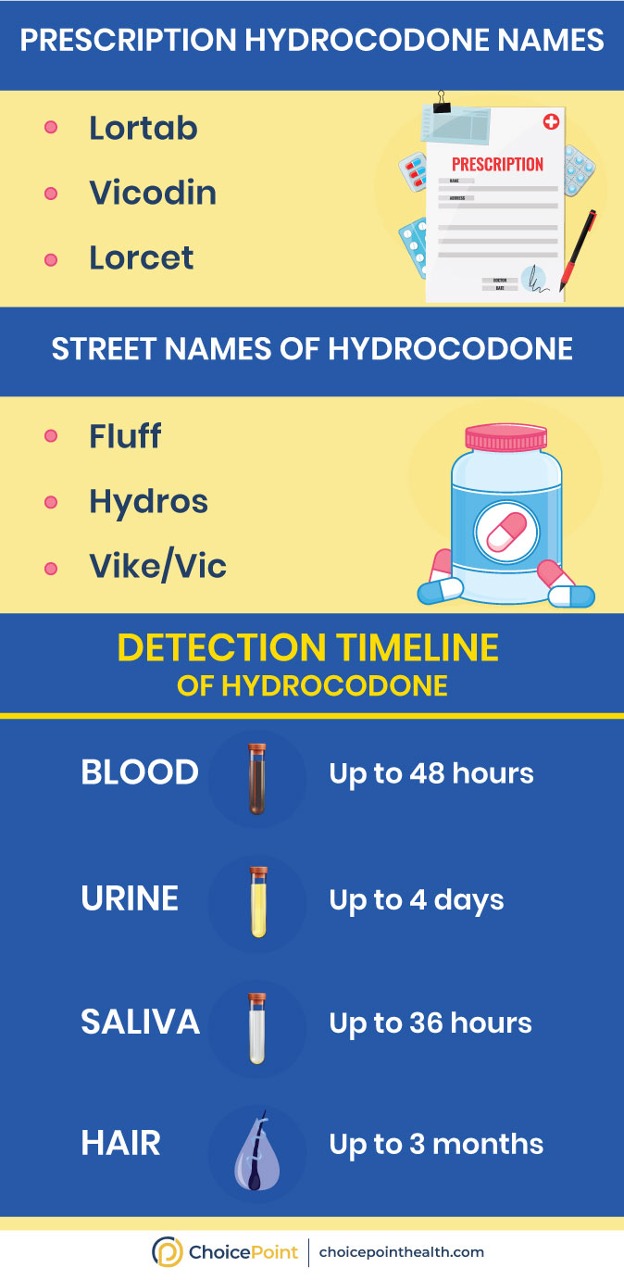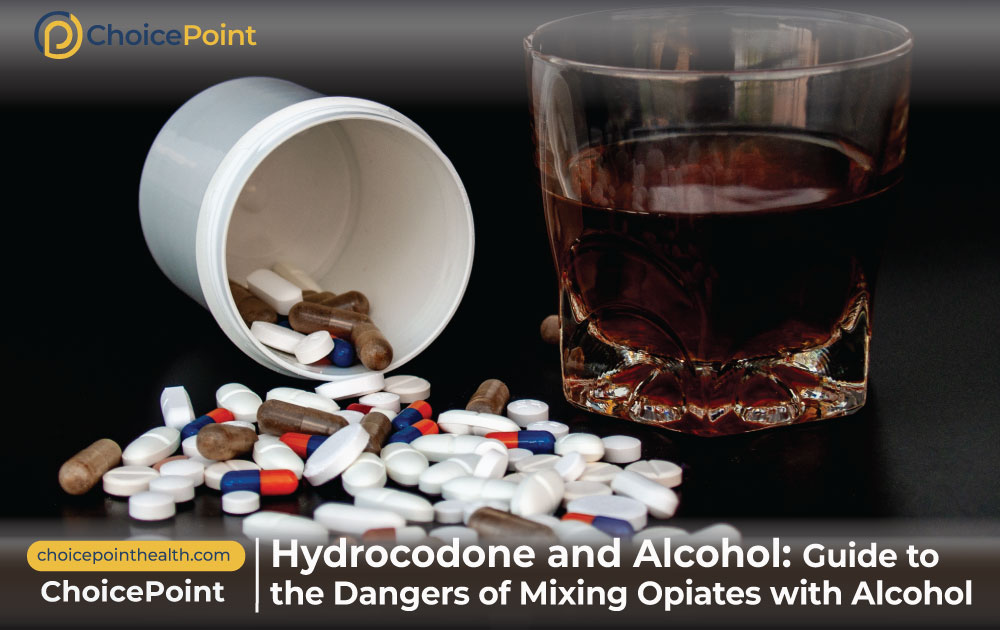The excessive prescriptions of prescription medications drive the opioid crisis. As compared to 1999, the rate of prescriptions is three times higher. According to research, about 40% of people using illicit opioid medications started with prescription opioids beforehand. Hydrocodone is one such medication. While it is very effective when used appropriately, some interactions must be understood. Hydrocodone and alcohol are a risky as well as fatal mixture due to the nature of both substances.
Article at a glance:
- Risks of drinking on hydrocodone.
- Dangers of mixing opioids and alcohol
- Why people abuse prescription medications.
- Why treating addiction in chronic pain patients is important
- FAQs
Do you feel like your reliance on hydrocodone is increasing? Worry not, help is here. Contact DEA-certified specialists at 844.445.2563 or via the online form.
Table of Contents
What Is Hydrocodone (Vicodin®)?
Hydrocodone is an opioid used to manage chronic pain. It also works as a cough suppressant. It is usually prescribed when nonopioid medications cannot treat the pain. Being a Schedule 2 drug, it needs a prescription to obtain. Its brand name is Vicodin®.
Reasons Hydrocodone Is Addictive
- Biological factors like genetics and brain circuitry contribute to both conditions.
- Psychological factors like stress and trauma worsen symptoms.
- Social determinants like stigma and access to healthcare play significant roles.
- Opioid medications pose a risk of misuse and addiction in pain management.
- Treatment requires an integrated approach addressing both conditions simultaneously.

Did you know? Patients with chronic pain are also prone to addiction. About 10% of chronic pain patients misuse opioids.

Did you know? Patients with chronic pain are also prone to addiction. About 10% of chronic pain patients misuse opioids..
The Essence of Hydrocodone and Alcohol
Hydrocodone and alcohol are both central nervous system (CNS) depressants. This means they slow down the brain’s processes, disrupting normal bodily functions. The bodily functions affected by CNS depressants include:
- Cognitive functions
- Heart and blood pressure
- Respiratory functions
Hydrocodone is an opioid, which means that it can accentuate the effects of alcohol. That can lead to a fatal combination.
| Properties | Hydrocodone | Alcohol |
|---|---|---|
| Chemical Classification | Semisynthetic opioid | Ethanol: A depressant |
| Medicinal Uses | Prescribed for pain relief and cough suppressant. | Limited medical use (e.g., as an antiseptic sometimes), mainly used recreationally. |
| Interactions | May interact with other CNS depressants (e.g., alcohol, benzodiazepines), enhancing sedation. | Can interact with other CNS depressants (e.g., opioids, benzodiazepines) to enhance sedation. |
| Drug Class | Classified as a Schedule II controlled substance in the United States due to its high potential for abuse and dependence | Legal for recreational consumption in many countries, regulated by age restrictions and other laws. |
Co-Occurrence of Chronic Pain and Addiction
Dependence on substances is common in patients who suffer from addiction. Chronic pain urges the patient to abuse drugs like opioids or alcohol. Persistent pain can also give rise to other mental health issues like depression and anxiety. What can help a patient deal with mental distress and also prevent abuse of prescription medication?
Dual Diagnosis Treatment
Dual diagnosis is a condition where a person suffers from two illnesses simultaneously. If you suffer from depression due to chronic pain and drug addiction, specialized treatment should be taken. Benefits of dual diagnosis treatment include:
- Developing techniques to deal with dual diagnosis
- Establishing a healthy relationship with your medicines
- Putting your health as a priority
DEA-certified professionals can help you get over an addiction, even if you feel you are genetically disposed to it.

Hydrocodone Addiction And Abuse
Risks with Hydrocodone and Alcohol
As it is clear by now, hydrocodone and alcohol are a very dangerous mixture. If you are on any opioid medication, avoiding alcohol is the best idea for the following reasons.
Heightened Side Effects
Mixing two CNS depressants can result in increased sedation, risk of respiratory depression, and even coma. If you have taken hydrocodone and drink alcohol on top of that, the sedation level may become increasingly high, leading to:
- Impaired concentration levels
- Unconsciousness
- Impaired decision-making
Since all drugs are metabolized in the liver, putting too much pressure on it can be very unhealthy. Moreover, both substances disrupt normal heart rate and blood pressure levels.
Increased Risk of Overdose
While hydrocodone is considered a weak opioid, compared to other drugs in this class, when coupled with alcohol, the risk of overdosing becomes high. Alcohol is responsible for accidental poisoning due to overdose, especially when mixed with other substances. Risks associated with overdose include:
- Permanent brain damage
- Vomiting
- Unconsciousness
- Seizures
- Coma
- Death
Getting instant medical help for alcohol or opioid overdose is imperative to prevent death.
Avoid fatal consequences by treating your addiction. Contact us at 844.445.2563 or enter your information here to book an appointment with our Drug Enforcement Administration-certified specialists.
Seek Help for Substance Addiction
If you have been prescribed hydrocodone for pain management and you struggle with alcohol addiction, getting professional help is necessary. Help is necessary even if you feel you depend on Hydrocodone alone.
With expert staff and a healthy environment, ChoicePoint is well-equipped with tools to help you overcome drug abuse. Our treatment plans include:
Whether you are looking for inpatient rehabilitation, outpatient, partial care, or even virtual treatment, we have you covered.
Our Insurance Policy
We accept insurance from most insurance providers. All you need to do is verify your insurance here. Once this process is completed, treatment can be initiated.
People Also Ask…
Some commonly asked questions regarding hydrocodone and alcohol are answered below to elucidate some facts.
What Happens if You Mix Opioids and Alcohol?
Opioids and alcohol, when mixed, even in small amounts, can severely impact the nervous system. It slows down brain activity, which can lead to dangerous respiratory depression, brain fog, and dizziness. Thus, if you are already taking opioids, drinking alcohol is not considered safe.
Can Alcohol Be Mixed With Other Drugs?
Mixing alcohol with medicinal, illicit drugs, or other substances such as opioids can be very dangerous and even fatal. Combining various other substances with alcohol can amplify their effects, leading to severe health complications such as respiratory depression, organ damage, etc.
Is It OK to Take Painkillers With Alcohol?
The optimum period during which you should avoid taking a painkiller after drinking depends on factors such as the nature of the painkiller, the amount of alcohol consumed, your overall health condition, and your tolerance to both alcohol and pain medications. The risk of combining alcohol and painkillers is higher for those who either take painkillers regularly or people who drink heavily. However, it is best advised to wait for 10 hours before you take painkillers.
Is It OK to Take Painkillers With Alcohol?
Taking painkillers with alcohol can be harmful. It is particularly harmful in the case of older people and people with certain health conditions. Combining a painkiller like ibuprofen and alcohol can cause gastrointestinal (GI) bleeding and kidney or liver problems.
What Is Hydrocodone Used For?
Hydrocodone is used as a cough suppressant. It is also used as an agent to treat pain. It acts on the central nervous system to relieve pain, which is why using it regularly can cause physical and mental dependence. To prevent that, hydrocodone should be used carefully.
Which Is Stronger, Oxycodone or Hydrocodone (Vicodin®)?
Oxycodone is stronger than hydrocodone. The low dose of Oxycodone has similar effects to a high dose of hydrocodone. The risk of overdose is also higher with Oxycodone.
Medical Disclaimer:
ChoicePoint aims to improve the quality of life for people struggling with substance use disorder and mental health issues. Our team of licensed medical professionals research, edit and review the content before publishing. However, this information is not intended to be a substitute for professional medical advice, diagnosis, or treatment. For medical advice please consult your physicians or ChoicePoint's qualified staff.










Review Hydrocodone and Alcohol: Guide to the Dangers of Mixing Opiates with Alcohol.